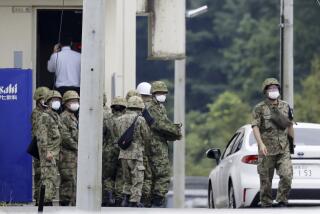Rightist Held in Shooting of Blunt Nagasaki Mayor
TOKYO — Police arrested a reputed leader of a right-wing extremist group Thursday in the shooting of Mayor Hitoshi Motoshima of Nagasaki, who had provoked nationalist ire and received numerous death threats after remarking 13 months ago that Emperor Hirohito was partly responsible for World War II.
The man under arrest, Kazumi Tajiri, 40, confessed to firing a single pistol shot into Motoshima’s back as he left the city hall a few hours earlier, a police spokesman said.
Tajiri was arrested in a local hotel and charged with attempted murder after fleeing the scene in a rental car, which the police found abandoned less than half a mile away. Tajiri had rented the car in his own name, which allowed the police to track him down, the spokesman said.
Motoshima, 67, was reported in stable condition Thursday night at Nagasaki Public Hospital after undergoing two hours of surgery. The bullet bounced off a rib, pierced the left lung and narrowly missed the mayor’s heart before emerging from his chest, surgeons were quoted as saying.
The shooting was decried by political leaders and social commentators as an act of terrorism. Some of them warned that free speech in Japan is under attack by the right wing.
“Speech must be refuted only with speech,” said Tsuruo Yamaguchi, secretary general of the Japan Socialist Party, who was himself attacked, but not injured, by right-wing extremists while delivering a lecture last May. “The use of violence cannot be permitted.”
Tajiri was identified by police as a leader of Seiki Juku, a rightist organization of 31 members established in Nagasaki in 1981. A man answering the telephone at Seiki Juku’s office Thursday night said the group had no comment on Tajiri’s arrest or the attempt on Motoshima’s life.
Controversy erupted in December, 1988, after Motoshima addressed the question of the late Emperor Hirohito’s wartime responsibility in remarks before the Nagasaki City Assembly on the 47th anniversary of Japan’s attack on Pearl Harbor. Nagasaki was devastated by a U.S. atomic bomb on Aug. 9, 1945, three days after Hiroshima. Japan surrendered on Aug. 15.
Motoshima’s comments broke a clear-cut taboo on criticizing Hirohito, who was then on his deathbed suffering from cancer.
Right-wing groups denounced Motoshima. Japan’s hard-core nationalists, many of whom allegedly have ties to organized crime, typically glorify the emperor and wear military-style uniforms. The groups, which number in the hundreds, are generally considered harmless, but violence occasionally erupts.
More to Read
Sign up for Essential California
The most important California stories and recommendations in your inbox every morning.
You may occasionally receive promotional content from the Los Angeles Times.










